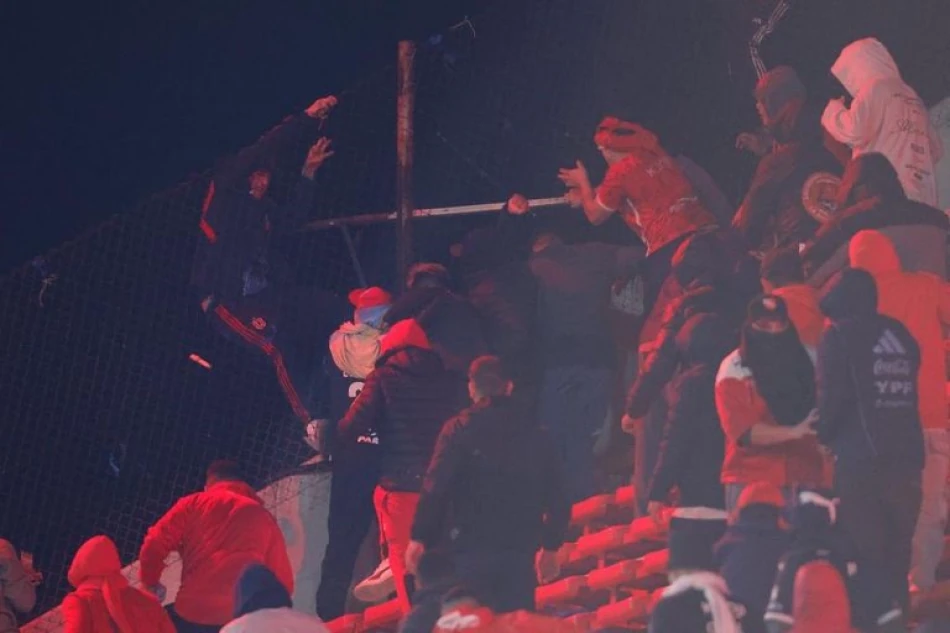
Shocking Scenes from Argentina: 10 Killed in Soccer Match Tragedy (Video)
Football Violence Erupts in Buenos Aires as Copa Sudamericana Match Descends into Chaos
A Copa Sudamericana match between Argentina's Independiente and Chile's Universidad de Chile was abandoned Wednesday night after violent clashes between rival supporters left 10 people injured and led to 90 arrests. The incident at Buenos Aires' Estadio Libertadores de América represents the latest escalation in South American football's ongoing battle with fan violence, raising serious questions about stadium security protocols and cross-border match safety.
Match Abandoned After Stadium Invasion
The Round of 16 second-leg fixture was halted in the 48th minute with the score tied 1-1, following what witnesses described as chaotic scenes of fan violence. Independiente supporters breached security barriers and invaded the section allocated to visiting Chilean fans, leading to physical confrontations that included beatings and the stripping of supporters' clothing.
The violence escalated during halftime when Chilean supporters began hurling stones, sticks, bottles, and seats at sections housing home fans. Among the projectiles thrown was a sound bomb, creating panic throughout the stadium.
Diplomatic Concerns Emerge
Chilean Ambassador to Argentina José Viera-Gallo confirmed that at least one person suffered serious knife wounds, though their nationality remains unknown. The diplomatic involvement underscores how football violence can strain international relations, particularly when visiting supporters are targeted in organized attacks.
Chilean President Gabriel Boric took to social media to demand accountability from match organizers, highlighting the political sensitivity surrounding the incident. His intervention reflects growing governmental concern about South American football's reputation on the international stage.
Security Failures Under Scrutiny
The incident has exposed critical flaws in stadium security planning. Independiente supporters openly criticized the decision to place visiting fans in sections adjacent to home supporters, a seating arrangement that violated basic crowd control principles used in European stadiums.
Chilean international Felipe Loyola, who plays for Independiente, captured the security breakdown in stark terms: "This level of violence cannot be tolerated. I don't know where the police were."
The 90 arrests occurred outside the stadium as authorities attempted to prevent further disorder, but the primary violence unfolded inside with apparently minimal police intervention.
Regional Pattern of Football Violence
This incident continues South America's troubling trend of fatal football violence. Just months earlier in April, two people died in clashes between supporters and police outside Santiago's Estadio Monumental before a Copa Libertadores match between Chile's Colo Colo and Brazil's Fortaleza.
The recurring nature of these incidents suggests systemic problems with crowd control across the continent's major football competitions. Unlike European leagues that have largely eliminated fatal fan violence through strict segregation and advanced security measures, South American football continues to struggle with organized supporter groups known for violent behavior.
Tournament Implications
With Universidad de Chile holding a 1-0 advantage from the first leg and the match abandoned at 1-1, CONMEBOL faces a complex decision about how to resolve the tie. The governing body's response will likely set precedents for future incidents and could influence whether clubs face sanctions for failing to ensure visitor safety.
The incident also raises questions about Argentina's ability to host major international football events safely, particularly given the country's bid to co-host the 2030 World Cup with Uruguay and Paraguay.
Broader Impact on South American Football
The violence threatens to damage South American football's commercial appeal at a time when leagues are competing globally for television revenues and sponsorship deals. International broadcasters and sponsors increasingly factor security concerns into their investment decisions, making incidents like this economically damaging beyond their immediate human cost.
For traveling supporters, the incident reinforces perceptions that away matches in certain South American venues carry unacceptable risks, potentially reducing the passionate cross-border support that makes continental competitions unique.
Both clubs condemned the violence, but their statements highlight a fundamental challenge: how to maintain the intense atmosphere that defines South American football while ensuring basic safety for all supporters, regardless of which team they support.
Most Viewed News

 Sara Khaled
Sara Khaled






